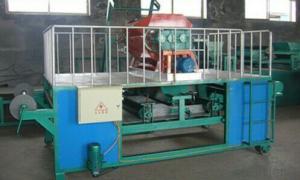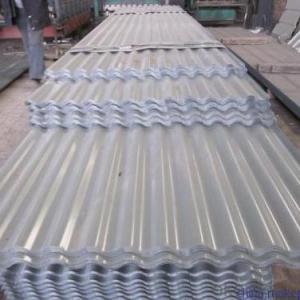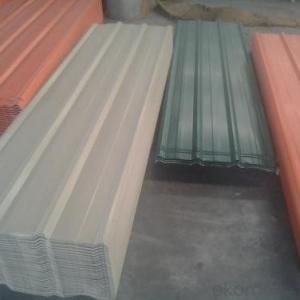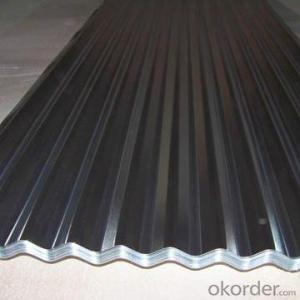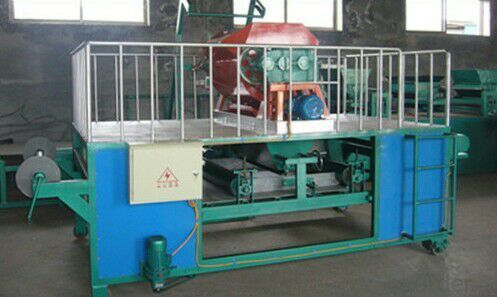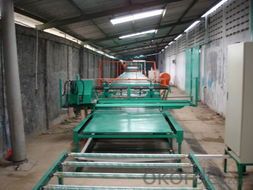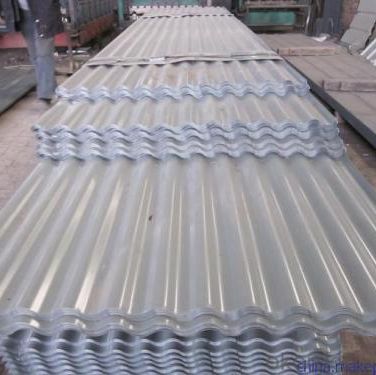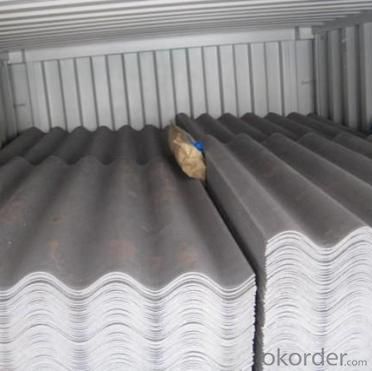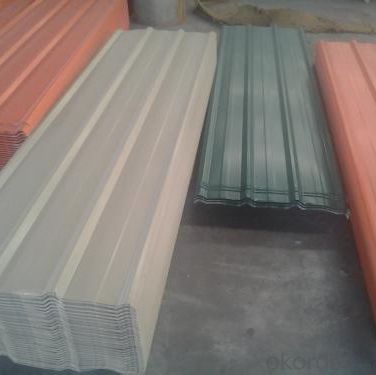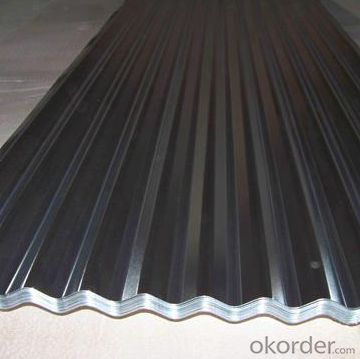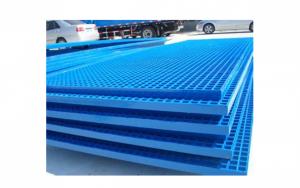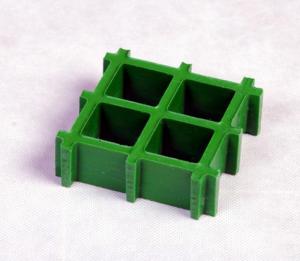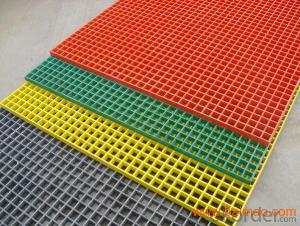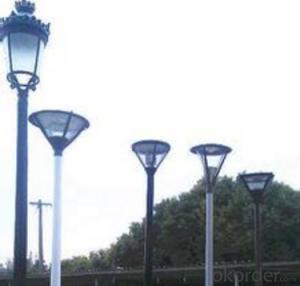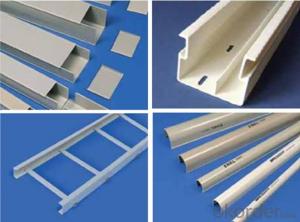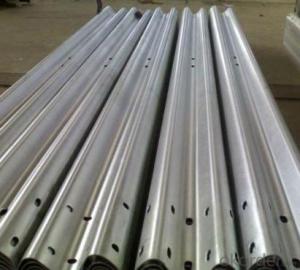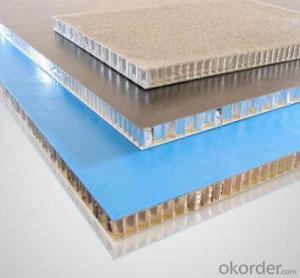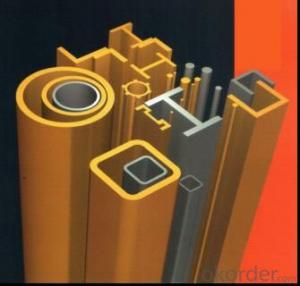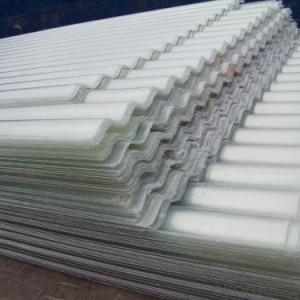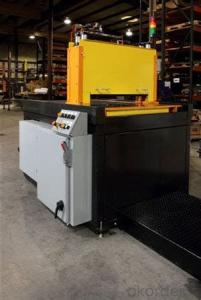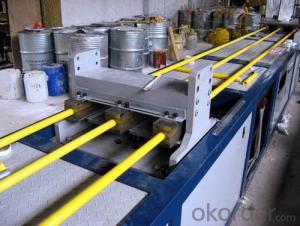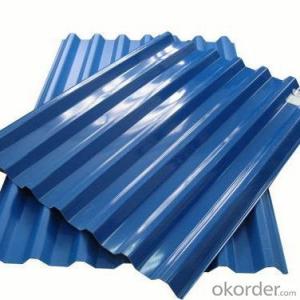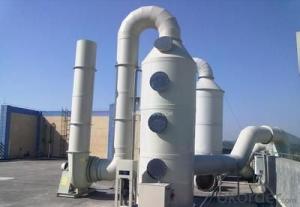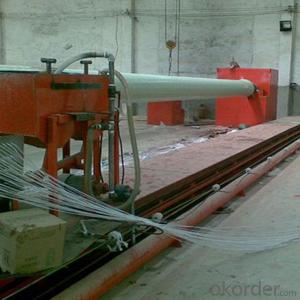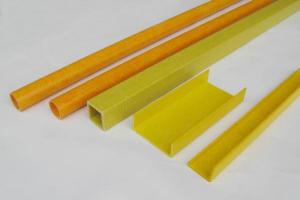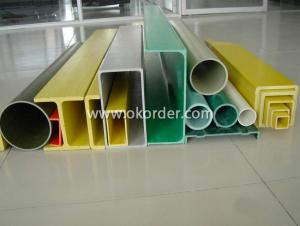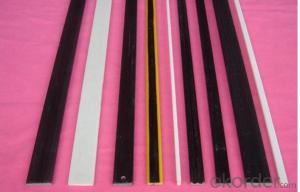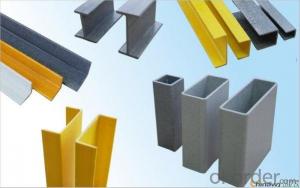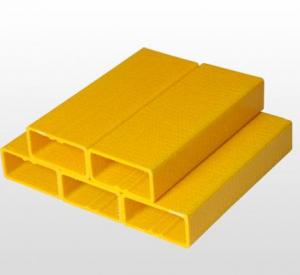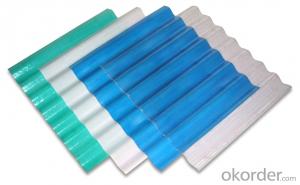FRP Pultrusion Profiles:Anti-Corrosion, Anti-Rust, High-Quality FRP Pultruded Grating
- Loading Port:
- Tianjin
- Payment Terms:
- TT OR LC
- Min Order Qty:
- 20000 m.t.
- Supply Capability:
- 300000 m.t./month
OKorder Service Pledge
OKorder Financial Service
You Might Also Like
Specification
PRODUCT DESCRIPTION
Pultruded grating is made by a particular assembly process, which using “I” shape as its main load-bearing and special rod to go through the bearing bar. Pultruded grating include the standard grating and the custom grating, the custom grating can be designed to meet customer’s requirement or special using condition by changing the shape, size and space of the bearing bars, the surface can be covered with lozenge panel, grit panel, or added the anti-slippery sand directly.
FRP pultruded grating has the most characteristics of molded grating, but it has its distinct advantages, it has very high fiberglass content in the loading direction, so it has very high load capability, it has more superiority when used at wide span, so that the basic support will be decreased and the project cost will be reduced accordingly.
SPECIFICATION
The standard space between two crossbars is 6 inch or 12 inch.
Thickness (mm) | Bar width (mm) | Open space (mm) | Open rate (%) | Approx weight (kg/m |
25.4 | 15.2 | 22.8 | 60 | 13.2 |
25.4 | 15.2 | 15.2 | 50 | 15.9 |
25.4 | 15.2 | 10.1 | 40 | 18.5 |
25.4 | 40 | 10.8 | 21 | 14.5 |
38.1 | 15.2 | 22.8 | 60 | 15.8 |
38.1 | 15.2 | 15.2 | 50 | 19.1 |
38.1 | 15.2 | 10.1 | 40 | 22.4 |
50.8 | 25.4 | 25.4 | 50 | 16.6 |
50.8 | 25.4 | 12.7 | 33 | 21.1 |
CHOICE FOR PULTRUDED GRATING
Resin: GP resin, ISO resin, VE resin, Phenol resin
Color choice: Yellow, gray, green, custom color
Surface choice: Groove surface, grit surface, lozenge cover surface
FEATURES
a. Anti-corrosion and anti-rust
b. Light weight and high strength
c. Anti-flammable
d. Anti- fatigue
e. Safe and anti-slippery
f. Anti-ageing
g. Easy of maintenance
h. Excellent electromagnetism property
i. Good economic benefit
FIELDS SERVED
Sewage treatment,
water supply and drainage,
chemical industry,
oil industry,
power engineering,
pulp and paper,
construction engineering,
spinning, marine engineering.
APPLICATION
Operation terrace,
stair walkway,
ground floor,
trench cover,
sidewalk,
foot bridge,
equipment safety fence,
scaffold.
COMPANT DESCRIPTION
CNBM,China National Building Materials Group is a state-owned enterprise in charge of administrative affairs in china building materials industry. Established in 1984, CNBM is a large group corporation of building materials with total assets of 25 billion RMB and a total staff of 30,000.CNBM now owns 200 subordinating firms of solely owned and joint-venture companies.
CNBM International Corporation is one subsidiary of CNBM, we focus on offering good-quality products,professional service and complete solution to our customers. Strong delivery capacity, advanced technology& management, strong financing capability and excellent after-sale service are our advantages in sharing international market.
FAQ
Q1.What's your sample policy?
A:We can supply the sample if we have ready parts in stock, but the customers have to pay the courier cost.
Q2.Can you produce according to the samples?
A: Yes, we can produce or modify the products according to your request.
Q3.How do you deliver the goods to my country?
A:We can provide international express, such as DHL, EMS, UPS, FedEx, etc. We select air freight and sea freight upon your requests. Quotations if without mentioning the shipping costs are shipping fee excluded.
Q4.How much does it cost to ship to my country?
A:When you goanna to place an order, please contact us, because different country has different freight.
Q5.How to get the catalogue?
A:please contact us and tell us what you are looking for.
We will try our best to meet customers' demands. Welcome you come here to visit us. We sincerely welcome partners around the world to establish business cooperation with us on the basis of mutual trust, benefit and development.
PICTURES
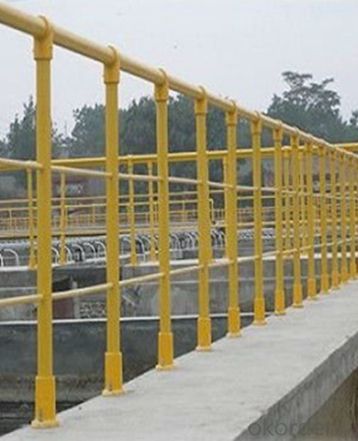
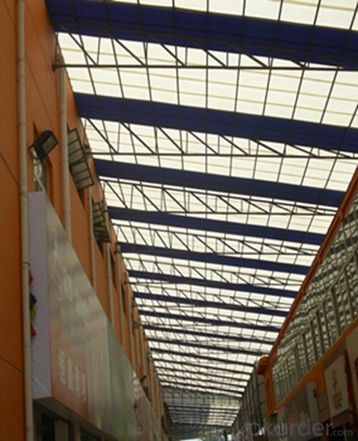
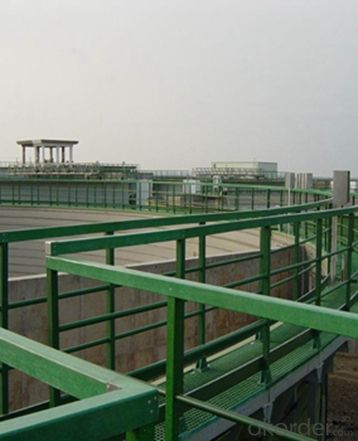
- Q: Are FRP pultrusion profiles resistant to moisture or humidity?
- FRP pultrusion profiles boast exceptional resistance to moisture and humidity. Through the pultrusion process, continuous fibers are thoroughly saturated with a polymer resin, resulting in a steadfast and enduring composite material. This composite possesses inherent moisture resistance, differing from conventional materials like wood or metal, as it does not absorb water. Moreover, FRP pultrusion profiles exhibit a minimal coefficient of thermal expansion, minimizing the likelihood of expansion or contraction in response to varying humidity levels. This moisture and humidity resistance render FRP pultrusion profiles suitable for a diverse array of applications, including outdoor structures, marine environments, and other areas prone to moisture.
- Q: How do FRP pultrusion profiles handle cyclic torsion loads?
- FRP (Fiber Reinforced Polymer) pultrusion profiles are designed to handle cyclic torsion loads effectively. The unique properties of FRP materials make them highly resistant to fatigue, making them suitable for applications where cyclic torsion loads are expected. One key advantage of FRP pultrusion profiles is their high strength-to-weight ratio. Reinforced with fibers such as glass or carbon, these profiles offer excellent tensile strength and stiffness, enabling them to withstand repeated torsional forces without deformation or failure. Moreover, FRP pultrusion profiles exhibit superior resistance to corrosion and chemical degradation compared to traditional materials like steel. This resistance ensures that the profiles maintain their structural integrity even in harsh environments where cyclic torsion loads may be prevalent. The manufacturing process of pultrusion also contributes to the ability of FRP profiles to handle cyclic torsion loads. During pultrusion, continuous fibers are impregnated with a polymer resin and then pulled through a heated die, where they are cured and shaped into the desired profile. This process ensures a uniform distribution of fibers throughout the profile, resulting in enhanced strength and stiffness in all directions, including torsion. To further enhance the performance of FRP pultrusion profiles under cyclic torsion loads, engineers employ design techniques such as optimizing the fiber orientation and selecting appropriate resin systems. These measures help distribute the torsional forces evenly across the profile, minimizing stress concentrations and improving the fatigue resistance. In summary, FRP pultrusion profiles are specifically engineered to handle cyclic torsion loads. Their high strength-to-weight ratio, resistance to corrosion, and uniform fiber distribution make them an ideal choice for applications where cyclic torsion loads are a concern.
- Q: How do FRP pultrusion profiles handle torsion loads?
- FRP pultrusion profiles are designed to handle torsion loads effectively due to their inherent properties. The continuous fibers in the profile provide excellent resistance to torsional forces, ensuring high strength and stability. The pultrusion manufacturing process also allows for precise control over the fiber orientation, resulting in profiles that can efficiently handle torsion loads without compromising their structural integrity.
- Q: What is the impact resistance of FRP pultrusion profiles?
- The impact resistance of FRP (Fiber Reinforced Polymer) pultrusion profiles is generally quite high. FRP pultrusion profiles are made by pulling reinforcing fibers, such as fiberglass, through a resin bath and then into a heated die, where the resin cures and solidifies. This manufacturing process creates a strong and durable composite material with excellent mechanical properties, including impact resistance. The specific impact resistance of FRP pultrusion profiles can vary depending on the specific formulation and design of the profile, as well as the type and orientation of the reinforcing fibers used. However, in general, FRP pultrusion profiles have been found to have superior impact resistance compared to traditional materials like steel or aluminum. The combination of the reinforcing fibers and the resin matrix in FRP pultrusion profiles provides enhanced strength and toughness, which allows the profiles to withstand high impact loads without cracking, breaking, or deforming. This makes FRP pultrusion profiles suitable for a wide range of applications where impact resistance is critical, such as in construction, transportation, and sporting goods. Furthermore, FRP pultrusion profiles can be designed to have varying levels of impact resistance by adjusting the fiber content, fiber orientation, resin type, and other factors during the manufacturing process. This allows for customization of the profiles based on specific application requirements. In conclusion, FRP pultrusion profiles offer excellent impact resistance due to the combination of reinforcing fibers and resin matrix. Their high strength, toughness, and ability to withstand impact loads make them a reliable choice for various industries and applications.
- Q: Are FRP pultrusion profiles resistant to acids?
- Yes, FRP pultrusion profiles are generally resistant to acids due to the corrosion-resistant properties of the composite material used in their construction.
- Q: Are FRP pultrusion profiles resistant to oil or fuel spills?
- Yes, FRP pultrusion profiles have inherent resistance to oil and fuel spills. The combination of the fiberglass reinforcement and the resin matrix used in their construction make them highly resistant to the corrosive effects of oil and fuel, making them a suitable choice for applications where exposure to such spills is expected.
- Q: Are FRP pultrusion profiles resistant to graffiti?
- FRP pultrusion profiles are generally resistant to graffiti due to their unique characteristics and composition. Pultruded fiberglass reinforced plastic (FRP) profiles are manufactured using a combination of high-strength fibers and a polymer resin matrix, resulting in a highly durable and robust material. One of the key advantages of FRP profiles is their excellent resistance to various forms of corrosion, including chemical, moisture, and UV resistance. These properties make FRP profiles less susceptible to the damaging effects of graffiti. Unlike traditional materials such as wood or metal, FRP pultrusion profiles do not provide a porous surface that allows paint or markers to penetrate and adhere easily. Additionally, FRP profiles are often produced with a smooth and non-porous finish, further deterring the attachment of graffiti. Even if graffiti is applied to the surface, it can be easily removed using non-abrasive cleaning methods without causing any damage to the profile's structural integrity or appearance. However, it is important to note that no material is completely immune to graffiti. Determined vandals may still find ways to leave marks on FRP profiles using specialized graffiti materials or techniques. Nonetheless, the resistance of FRP pultrusion profiles to graffiti is significantly higher compared to many other conventional materials, making them an ideal choice for areas prone to vandalism or graffiti attacks.
- Q: FRP pultrusion process?
- Reinforcement materials used in pultrusion processes, mainly glass fibers and their products, such as roving, continuous fiber felt, etc.. In order to meet the special requirements of the products, aramid fiber, carbon fiber and metal fiber can be used. No matter which fiber is used in the pultrusion process, the surface must be treated so that it can be well bonded with the resin matrix.
- Q: Can FRP pultrusion profiles be used in the oil and gas industry?
- Yes, the oil and gas industry can utilize FRP (Fiber Reinforced Polymer) pultrusion profiles. These profiles offer numerous advantages that make them suitable for use in this sector. To begin with, FRP pultrusion profiles exhibit corrosion resistance. They remain unaffected by harsh conditions such as saltwater, chemicals, and extreme temperatures, thereby avoiding rusting, corrosion, or degradation. Consequently, they prove ideal for offshore platforms, pipelines, and other oil and gas facilities where corrosion poses a significant problem. Moreover, FRP pultrusion profiles possess a high strength-to-weight ratio. Despite being lightweight, they possess remarkable strength, enabling efficient installation, transportation, and handling. This aspect is especially advantageous in the oil and gas industry, where reducing weight is crucial for enhancing operational efficiency and decreasing costs. Additionally, FRP pultrusion profiles can be customized to meet specific requirements. They can be manufactured in various shapes, sizes, and configurations, making them adaptable for diverse applications within the oil and gas industry. Whether it be for structural supports, grating, handrails, or other components, FRP pultrusion profiles can be tailored to perfectly suit the distinct needs of each project. Furthermore, FRP pultrusion profiles offer exceptional electrical insulation properties. This attribute holds immense importance in the oil and gas industry, where electrical safety is of utmost priority. By providing insulation and preventing electrical conductivity, FRP profiles reduce the risk of accidents and ensure the safety of both personnel and equipment. In conclusion, FRP pultrusion profiles have demonstrated their reliability, durability, and cost-effectiveness across various applications within the oil and gas industry. Their resistance to corrosion, high strength-to-weight ratio, customization capabilities, and electrical insulation properties make them an appealing choice for this demanding sector.
- Q: Can FRP pultrusion profiles be used in oil and gas applications?
- Yes, FRP (Fiber Reinforced Plastic) pultrusion profiles can be used in oil and gas applications. FRP materials have excellent corrosion resistance, high strength-to-weight ratio, and low maintenance requirements, making them suitable for various demanding environments, including oil and gas. Additionally, FRP pultrusion profiles can be customized to meet specific requirements, such as resistance to chemicals, high temperatures, and fire.
Send your message to us
FRP Pultrusion Profiles:Anti-Corrosion, Anti-Rust, High-Quality FRP Pultruded Grating
- Loading Port:
- Tianjin
- Payment Terms:
- TT OR LC
- Min Order Qty:
- 20000 m.t.
- Supply Capability:
- 300000 m.t./month
OKorder Service Pledge
OKorder Financial Service
Similar products
Hot products
Hot Searches
Related keywords
